Plain Song Christmas Special is the official English translation of Uta Christmas, a freeware Japanese visual novel created by Eno Yamamoto Ten and originally released on Christmas day in 2001. The English version was first made available on October 11, 2005, as part of the al|together 2005 translation festival, was translated by Mr. Seung Park and Shii of Insani.
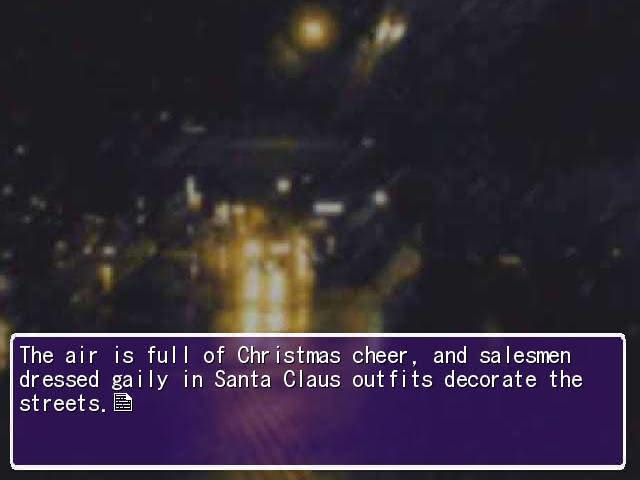
You can learn more about my al|together project by reading my project introduction article. That article includes a running list of our completed al|together reviews. I have a dedicated collection post with links to all of our al|together articles, including reviews, essays, and short posts.
Plain Song Christmas Special is by the same author of another al|together 2005 entry, Plain Song. More unsurprisingly, the novels are related. However, where Plain Song was a serious and charming piece about a lonely musician and the young lady who always stopped to listen to him, Christmas Specialty is a parody set in an alternate world rather than a sequel or side-story. Christmas Special demands some familiarity with the characters and tragic elements of Plain Song to appreciate, but its jokes are broadly applicable to certain trends in visual novel story telling that persist to this day.
How this review will be differently than my other al|together reviews
In all of my previous al|together reviews, I began by writing about each visual novel from the beginning. That is, I looked at each story in a comprehensive manner, examining its structure, aesthetics, plot, and miscellaneous points depending on the project. One reason this process worked for all previous reviews was that every other al|together game I had looked at stood on its own.
In contrast, Plain Song Christmas Special is closely related to Plain Song, another 2001 visual novel by Eno Yamamoto Ten which was also translated as part of al|together 2005. I published my Plain Song review along with the instant review, and you can read it here.
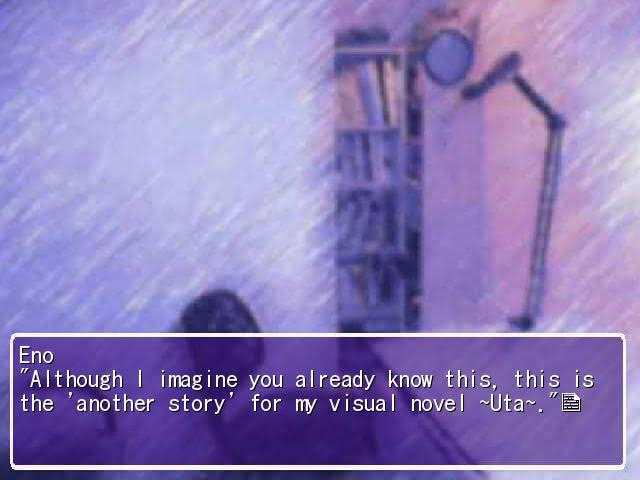
Whereas Plain Song is a serious story, Plain Song Christmas Special is a slapstick parody of Plain Song and of tropes commonly employed in visual novels with an emotional emphasis. One could read Plain Song Christmas Special without having read Plain Song, but many of the jokes require knowing Plain Song to appreciate.
Because there is no reason to read Plain Song Christmas Special without having read Plain Song, I will write my review from the perspective of someone who has already read Plain Song. To be clear, I will not spoil the plot of Plain Song – doing so is in no way necessary for reviewing Christmas Special. But I will presume some familiarity with the original (my review of Plain Song proper should be sufficient for purposes of this review). Thus, while you can certainly read and enjoy (I hope) this review without having read my review of Plain Song, you will get the most out of it if you have.
Plain Song Christmas Special Details
English release
| Title | Plain Song Christmas Special |
| Release Date | October 11, 2005 |
| Translators | Seung Park, Shii |
| Engine | ONScripter-EN |
| Official Website | al|together 2005 |
| Visual Novel Database | VNDB Link |

Japanese release
| Title | ~Uta~+αKURUSIMIMASU (or “Uta Christmas”) |
| Developer | Eno Yamamoto Ten |
| Release Date | December 25, 2001 |
| Engine | NScripter |
Downloading and running Plain Song Christmas Special
Plain Song is available as a torrent from the official websites for Windows, Linux, and MacOS. It is also available from a couple of sources as a direct download.
- al|together 2005 (Torrent)
- Kaisernet (Windows Direct)
If you are willing and able, I recommend seeding the official Plain Song Christmas Special torrent in order to ensure that the visual novel remains readily available going forward. However, the easiest way to obtain the game as of this writing is through the direct download link available on Kaisernet. Although Kaisernet only hosts a link to the Windows version of Plain Song Christmas Special, I published an article explaining how to extract the contents of an ONScripter-EN visual novel .exe file and run the game natively on Linux (the guide should also work for MacOS and BSD provided you use the proper ONScripter-EN version for those systems). (Note: Linux users should also be able to run the Windows version on top of WINE without any notable issues.) Direct downloads are also available from a MEGA folder put together by an individual who has been in contact with a couple of members of the al|together festivals (I contributed to completing the collection).
I ran the native Linux version of Plain Song Christmas Special, substituting the outdated version of ONScripter-EN provided with the original for the most up-to-date build. See my guides on running ONScripter-EN in a Linux directory (system-insall; local).
General overview of Plain Song Christmas Special
While I cannot say that Plain Song Christmas Special is the strangest of the al|together visual novels (because I have played Crimsoness, which I will review in April), it is certainly at least on par with Insant Death! Panda Samurai (see my review). Its protagonists are Ryuuji and Fuuka – just like in Plain Song – but it soon becomes clear that the Ryuuji and Fuuka of Christmas Special are quite different than the pair that readers meet in the real Plain Song. Just for example, Fuuka here is Santa Claus.
As I usually do, I turn to the original description by the translators on the al|together 2005 website:
Imagine that there is this doujin author who is best-known for a heartfelt piece about a lonely young musician who listens to him sing every day (well, that and an allegorical piece about a bird who searches for a certain golden fruit, but that is an entirely different matter).
The above statement references Eno’s two other works, Plain Song and The Poor Little Bird, respectively. As it suggests, both of those pieces were serious works – meaningful and sentimental sound novels. So what of Plain Song Christmas Special? I return to the festival description:
Now imagine that during one fateful winter vacation, this hitherto docile author snapped, and from this furor was born a piece that is 90% self-parody, 100% slapstick, and 100% quick to play through.
This is perhaps the finest short description of any al|together visual novel. Having played Plain Song Christmas Special and Eno’s more serious works, Insani’s account of what happened sounds plausible. Plain Song is a heartwarming piece about the relationship between a lonely musician and a shy young woman who was touched by his songs. If one ran Plain Song Christmas Special expecting a sweet follow-up, he or she would likely be disabused of the notion by the options on the title screen.
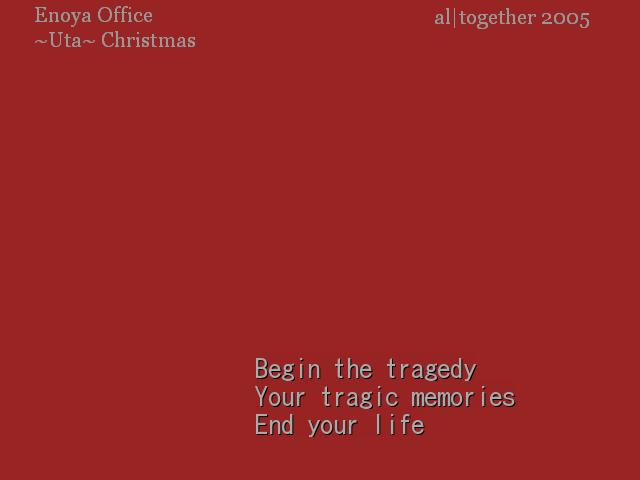
I went into Plain Song Christmas Special knowing that it was not a serious game, but not knowing exactly what to expect. I initially thought it would be something like the cast sessions after chapters of Higurashi When They Cry – where the characters gathered together and broke the fourth wall. However, it instead features a different setting featuring two characters with the same names. There are many references to Plain Song and visual novel tropes, but it is more detached from its namesake than I expected going in.
For his part, the author, Eno, wrote in the Readme file:
Apology: If you say ‘What the hell?’ ‘I don’t get it!’ etc. please contact me by email. Thanks for reading this silly file.
Now let us review the “silly file.”
Plain Song Christmas Special Review
Below, I review all of the different aspects of Plain Song Christmas Special. Note again that I will cross-reference Plain Song at times – albeit with no plot spoilers for the former.
Estimated reading time
As usual, I spent quite a bit of time collecting screenshots and trying choices (more on those shortly), so I did not read Plain Song Christmas Special to create a reliable time estimate. With that being said, the 26 minute estimate from two votes on Visual Novel Database sounds right for readers who go back through the game to try different choices – the conclusion can be reached quite a bit more quickly. Christmas Special is short – albeit not notably short given some of the shorter al|together entries.
Game-play and structure
Plain Song Christmas Special contains six choices. Given its brief length, the reader will never go too long without seeing a choice.
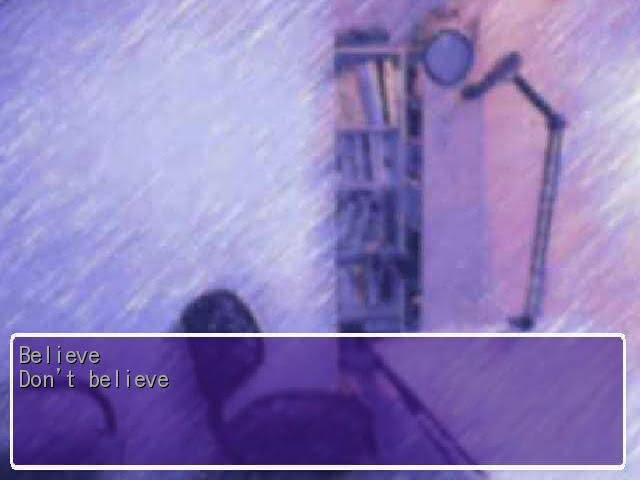
To be sure, some of the choices seem a bit unserious.

But choices exist for a reason. So, some of them must be important, right? After all, Plain Song had a few important choices necessary to reach the good ending. Let us see what the author had to say about the game’s structure in the Readme file:
Just click and choose between choices. There is only one ending.
“Only one ending.”
Thus, unlike Plain Song, none of the six choices in Christmas Special ultimately change the story. However, that too is played for laughs:

While Plain Song Christmas Special will drag the player to its ending no matter what the player does, selecting different choices produces different dialogue in their immediate aftermath, most of which play on different jokes and tropes. Like the original Plain Song, the menu includes an option to skip to the next choice – which makes it easy to try all of the different options after reading through the game once.
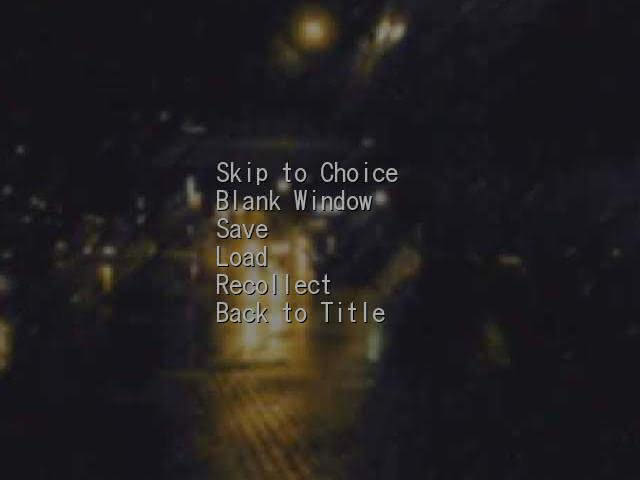
Also like Plain Song, it is not possible to save when a choice selection is on the screen.
Visual presentation
Plain Song Christmas Special is nearly identical to Plain Song in its visuals. They share the same photographic backgrounds.

The only differences between the two are the text box styles (Christmas Special has the better of it) and some of the UI elements.

Like Plain Song the original, Christmas Special is one of the simpler al|together visual novels in terms of visuals – and it looks distinctly like an NScripter/ONScripter-EN game of the era.
Music
Plain Song Christmas Special shares its songs with Plain Song, including using the same excellent music for the menu theme. However, the music has less of an effect in Christmas Special, owed both to its far shorter length and the fact that Christmas Special, unlike Plain Song, is not at all serious.
Translation quality
As always, I preface my translation analysis by noting that I cannot read Japanese. Thus, I am evaluating how Plain Song Christmas Special reads in English – not its fidelity to the original text.
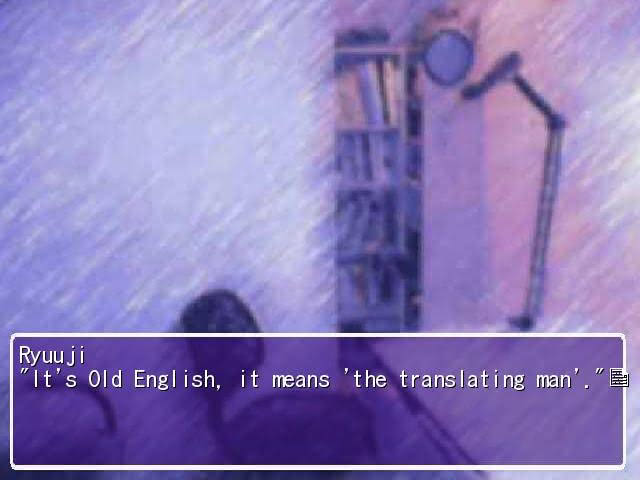
Plain Song Christmas Special, like Plain Song before it, reads very well in English. The jokes and choices come across clearly, which I imagine took some time and effort on the part of the translators. Both Christmas Special and Plain Song are among the better al|together translations in terms of how well they read, and they compare favorably to many commercial efforts.
Writing and story quality
Plain Song Christmas Special is a joke from beginning to end, so we can only really assess how funny and clever it is. Being a joke does somewhat limit a visual novel’s ceiling, but I came away enjoying the short time I spent with it more than I thought I would going in.

While I liked Plain Song on the whole, I did note some of my issues with its writing shortcuts. Christmas Special shows that the author, Eno, had self-awareness about this. Christmas Special makes light of some parts of Plain Song and some characteristics it shares with trends in emotional visual novels of the day, but the jabs it takes are in good fun.
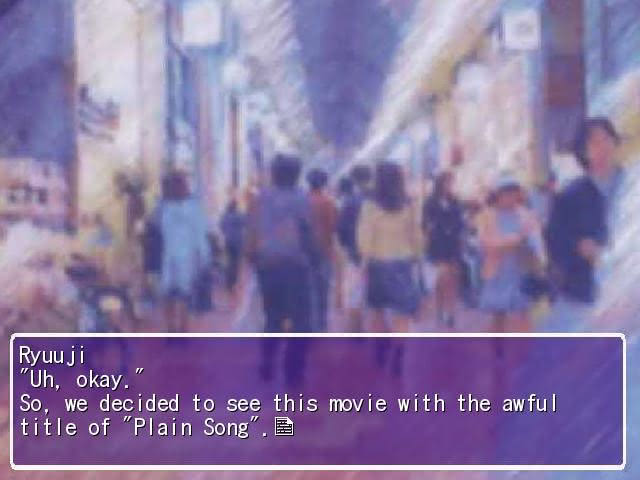
It should be impossible to read Plain Song without coming to the view that Eno cared about its protagonists, and Christmas Special does not change the impression of the original despite the fun it has with the Ryuuji and Fuuka of its world. Christmas Special also includes references to other visual novels and anime series – albeit one should bear in mind that the original was written in 2001 and the translation was completed in 2005.
If you take the time to read through Christmas Special, it is worth going back and trying different choices – despite the fact that none change the story. Part of the joke of Christmas Special is the illusion of choice – it is self-aware of the fact that no matter what you as Ryuuji do or how hard you struggle, you will be dragged along with its absurd plot. Attempts to choose anything but the “right” choice note in one way or another that your resistance is futile. There are a few instances when one choice will lead to some unexpected dialogue in light of what other choices lead to.
A special note for Plain Song readers
Staying true to my commitment to avoid explicit spoilers of Plain Song or even Plain Song Christmas Special – I will be vague here, but anyone who has read Plain Song’s good ending should understand what I am getting it.
Plain Song Christmas Special is set in a different world than Plain Song, and nothing in its story adds to our understanding of what happens in Plain Song. However, there is one interesting point in Eno’s post-credits commentary in Christmas Special which acknowledges the possibility that some readers of Plain Song may disagree with the view he advanced in the conclusion of Plain Song. In my review of the main game, I noted that Eno is opinionated in Plain Song, and understanding the correct choice at the end of that story requires understanding Eno’s perspective (it is not difficult). However, readers who see both the good end and the final bad end will grasp that there is some nuance in both – and that Eno’s opinion ultimately prioritized one over another. Careful readers of the humorous ending of Christmas Special should catch Eno’s allusion to the end of Plain Song and his commentary on that more serious project
Conclusion
Plain Song Christmas Special is a strange game – but I enjoyed it for what it is when I read it right after finishing Plain Song. Appreciating Eno’s strange humor in Christmas Special requires having read Plain Song and having some general familiarity with the types of visual novels and Japanese media that inspired it. But with the appropriate background, Christmas Special is amusing. To its credit, Christmas Special does not overstay its welcome. It is just long enough to deliver Eno’s jokes (and fourth-wall breaking credits), but not so long as to become tedious – I will say it stopped precisely when it needed to.

I will give Christmas Special a qualified recommendation for those who have read Plain Song, but it is in no way essential reading. It not only does not offer any additional context to Plain Song, it exists in a different world. There is no reason to read it without having read Plain Song, and I will venture that its humor may be hit or miss even for people who read its parent game. However, taken together with not only Plain Song but also The Poor Little Bird, Christmas Special’s self-awareness adds some interesting context to Eno’s perspective as a visual novel creator.